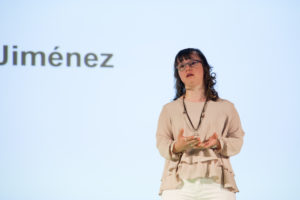Carmen Jiménez Recena, 23, is the first Spanish woman with Down Syndrome who went to stay abroad in the context of the Erasmus+ programme. A pharmaceutical laboratory assistant and volunteer with the Red Cross, she stayed in Portugal to follow training in a pharmacy. At the “Contagious solutions” conference organised by Plena Inclusión Madrid, she was interviewed.
We did a summary of the interview in English in the context of our campaign on “Education”. You can also read the interview in Spanish.

How did you learn that there is such a thing like Erasmus?
It was my sister who first went on Erasmus, to France. I thought about it and I realised that I wanted to also go further, get out and complement my professional training. And that’s how I decided to go on Erasmus!
How did your parents react when you told them you wanted to go on Erasmus?
Well, first they said no, but then my parents supported me!
Where exactly did you go?
I spent 6 weeks in a small village close to Porto. I did an internship at a pharmacy and had a range of tasks, such as implementing dispensation and sale protocols and controlling our stock. I am actually still in contact with people who speak Portuguese.
Did you get any support during your stay abroad?
I just had the support of Alba, a friend of mine who is now living in London. She supported me with the changing of the clocks*, getting to know the local customs, and the whole experience of living abroad, far away from where you’re coming from.
How did the Erasmus experience change you?
I discovered that I can trust my capabilities, be confident and self-assured. I can really say that it was life-changing. It was a long way, but it was also a special thing to do! I think it shows that everyone can do anything, it doesn’t depend upon our different capabilities or needs.
Where are you working right now?
Up until now, I was working in the pharmacy of a hospital, as a maternity cover. It was different from the pharmacy where I did my training, which was a pharmacy on the street. In a “normal” pharmacy you do pharmaceutical compounding, place orders for medicine etc. In a hospital pharmacy, on the other hand, we have refrigerators for all the medicine, we work with so-called pharmacy carousels to search for and get the right medicine and so on. So it is a very diverse field. My contract is finished now, but working in the hospital pharmacy has confirmed my passion for being a pharmacy technician.
* editor’s note: Portugal and Spain have different time zones





